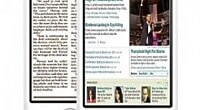The latest Good E-Reader News has reports that Palm has hired Goldman Sachs and Frank Quattrone’s Qatalyst Partners to find a buyer for the floundering company. Taiwan’s HTC Corp. and China’s Lenovo Group Ltd. have looked at the company and may be potential bidders…Dell Inc. also looked at Palm, though it decided against an offer.
Palm recently tried to get back into the game with the launch of the Pre and Pixi range of high-end smart phones based on the WebOS operating system. It looks like HTC may get the winning bid although HTC is committed to the Google Android Platform. One of the main reasons HTC is going after Palm is because of the patents on technology that they hold. Recently Apple has filled a large lawsuit against HTC for over 20 patent infringements. With the value of Palm being only 850 million dollars, it would be a bargaining for HTC to acquire palm and use their patents as leverage against Apple. Also with the sale HTC would gain full control over its own operating system. HTC’s biggest rivals – Apple, Nokia, Samsung – all have control over their own operating systems. HTC, meanwhile, is forced to share the Windows Mobile and Google Android systems it uses with other phone makers. This, analysts say, lessens HTC’s competitiveness and makes its phones less distinguishable from those of its rivals.
The Chinese Firm Lenovo group who is known for making mobile phones, is looking at the Palm acquisition to form a beachhead into the North American consumer market.
Despite the fact that Palm boasted an executive brass with many exe Apple employees and spearheaded by John Rubinstein, the company’s current CEO, whom jump shipped to the company after developing the iPod range of music players, and was one of the key figures behind WebOS. Palm seems to be floundering into obscurity and forming bad blood between their company and Apply whom had been a victim of Palms head hunting policy on grabbing up their internal talent.

Although the core technology of devices such as the Palm PRE and Pixi have received critical acclaim, the sales of the mobile devices have been lacklustre. Most high end users gravitated towards Google Android, RIM or Apple Smartphone’s and the value of the company has plunged, with Palm posting 11 straight quarterly losses. The latest version of the iPhone software, shown off for the first time last week, will let users run multiple applications at once, a feature that was one of WebOS ‘s main advantages over the Apple device.
Both of Palms major devices offered in the last year were offered through the Sprint Corporation instead of larger carriers such as Verizon. A person familiar with the situation said Palm partnered with Sprint because it couldn’t get the larger operators interested. Although AT&T will begin to carry the Palm range of smart phones starting next week it might be too late for Palm.
In order for Palm to remain a viable independent entity they need to invest heavily in marketing its products and in persuading software developers to write applications for WebOS, analysts said. To date, the number of programs for WebOS is a small fraction of that available for Google’s Android software, much less the iPhone.
How does the current Palm situation apply to e-readers? Palm currently owns and operates its own book store with over 37,000 e-book titles available. They have stand alone applications for mobile phones such as Blackberry and Apple.
Michael Kozlowski is the editor-in-chief at Good e-Reader and has written about audiobooks and e-readers for the past fifteen years. Newspapers and websites such as the CBC, CNET, Engadget, Huffington Post and the New York Times have picked up his articles. He Lives in Vancouver, British Columbia, Canada.
